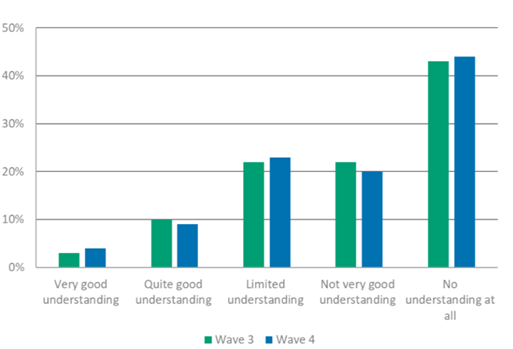
To improve awareness on T Levels among the business community an extension of the £1,000 incentive beyond July 2022 should be considered. Increased efforts and resources to explain the programme to employers, particularly SMEs, helping to navigate the system, are essential for the scheme’s success.
The UK higher education system is undergoing one of its most imporant reforms in the last decades, including the introduction of T Levels in September 2020. These are set to play a key role in the envisioned dual post-16 education system for the country, which will have two main pathways, an academic route (A Levels) and a vocational one (T Levels). Funding for other overlapping post-GCSEs options, including many BTECs, will be removed from 2024.
T Levels are two-year technical courses for 16-19 years old that combine 80% of classroom learning and 20% of industry placement. These have been designed in collaboration with employers to meet industry needs and effectively prepare students for work, further training or study. They are grouped by vocational routes such as Construction, Digital, Education & Childcare and Health & Science*.
Even though T Levels are the Government’s flagship vocational programme for young people, they are currently fairly unknown by the general public and the business community, as revealed in the Business West Quarterly Economic Survey Q3 2021. According to Ofqual’s Perceptions of Vocational and Technical Qualifications in England report, only 25% of learners had a very good or quite good understanding of T Levels in March 2021, a 5 points increase from the previous year but still significantly below the 35% reporting no understanding at all (down from 43% the previous year). Awareness of T Levels among employers was even lower, only 12% had a very or quite good understanding of these qualifications, only a point less than in 2020.
DfE’s £3 million “NexT Level” campaign launched in October 2019 to promote T Levels was put on hold during the first lockdown, and the communication and marketing efforts outlined in DfE’s T Level Action Plan 2021 fell short of the required effort to accelerate the understanding of these new qualifications, especially among employers. Businesses have a pivotal role in the scheme’s success, offering placements and down the line employing T Level graduates.
Some colleges running T Levels have reported difficulties in finding placements for all their T Level students, particularly in the digital route, but also in health and science. It has been reported that the NHS training tender has commissioned a study on the availability of offering placements in the NHS after T Level providers have not been able to source all industry placements locally.
In terms of numbers, 43 training providers delivered T Levels in the first year of the programme; there were 1,300 students enrolled on a T Level and 950 students enrolled on a T Level Transition Programme in 2020. Last year, 102 providers delivered T Levels; there were 5,450 new T Level students and 3,550 T Level Transition Programme participants in 2021. In comparison, there were 250,000 BTEC students in 2019.
The Government is paying a £1,000 incentive per industry placement to businesses that offer placements to T Level students (capped at 20 placements per company, £20,000). This incentive was launched in May 2021 and is available for businesses offering industry placements starting before 31 July 2022; an end date that, at-present, will not be extended. Given the lack of awareness among businesses of T Level qualifications and the seeming lack of available commercial placements for T Level students, this incentive should be extended, at least until the T Levels have been completely rolled out.
Employers have, in general, a lower understanding of vocational and technical qualifications options than students and teachers, their focus is on the day to day business matters. The move from apprenticeships frameworks to the standards model took years to communicate and implement, despite apprenticeships being the mainstream vocational scheme for decades. Eliminating a well-understood and recognised qualification, such as BTECs, when the new alternative is not on the employers’ radar might risk harming both parties: students and businesses.
Even if awareness of T Levels among businesses was greater, the reluctance to take part in the scheme offering placements to 16-19 years-olds with little to no professional experience could still be a real barrier. For a commercial organisation, the investment in staff time and resources required for guidance and support might not make it cost-effective.
The £1,000 payment is needed to encourage businesses to try out the scheme, during a time when there is still uncertainty about its benefits for employers. Removing this payment in July could be detrimental to the scheme’s prosperity, and slow down the compilation of success stories that could be used as examples for others to follow. An extension of this end date should be considered.
Lastly, a greater and more tailored effort needs to be made to ensure that businesses, especially SMEs which are less likely to have participated in the T Levels design, are aware and understand T Levels. Multiple business organisations, including Chambers of Commerce, and training or education providers are actively presenting the scheme to members and employers. However, as illustrated by the data, T Levels are still unknown for most firms.
Both, investment in proper and tailored signposting on how to navigate the system from an employer perspective, as well as time to allow businesses to adapt removing the current technical qualifications system, are probably required to make the transition to this new scheme work.
* All the Routes planned are: Digital; Construction; Education & Childcare; Health & Science; Legal, Finance & Accounting; Business & Administration; Engineering & Manufacturing; Health & Beauty; Catering & Hospitality; Creative & Design; and Agriculture, Environmental & Animal Care. There will be 24 T Level courses available by the end of the rollout.
Read more:
- Log in to post comments

